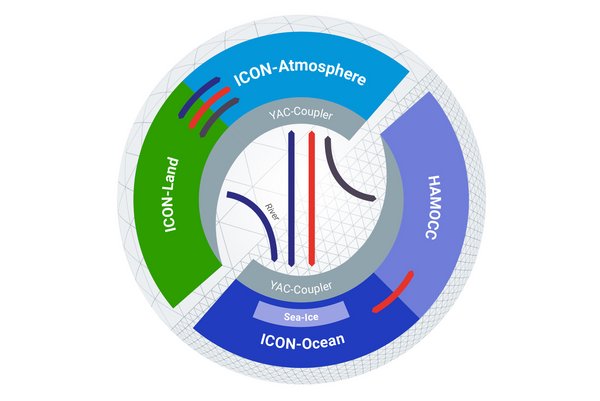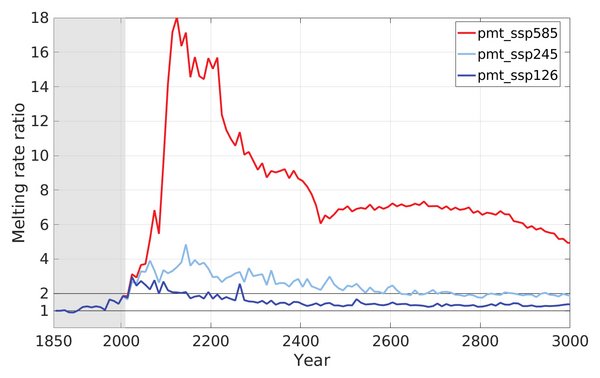
The first version of the ICON Earth System Model
A team of researchers around Dr. Johann Jungclaus from the Max Planck Institute for Meteorology (MPI-M) has published a paper in the Journal of…

Delayed response of subsea permafrost thaw to anthropogenic warming
Subsea permafrost is a previously overlooked component of the climate system. In a study published in The Cryosphere, the authors Stiig Wilkenskjeld…

Marie Skłodowska-Curie Postdoctoral Fellowship for Laura Suarez-Gutierrez
Dr. Laura Suarez-Gutierrez, scientist in the department “The Ocean in the Earth System” at the Max Planck Institute for Meteorology, successfully…

“Glaciers are the planet’s early warning system”: Ellen Mosley-Thompson and Lonnie Thompson win BBVA Climate Change Award
This year's recipients of the BBVA Frontiers of Knowledge Award in the Climate Change Category are Prof. Ellen Mosley-Thompson and Prof. Lonnie…
![[Translate to English:] [Translate to English:]](/fileadmin/_processed_/9/0/csm_T_Nobelpreis_b8429905ab.jpg)
Award of the Nobel Prize in Physics 2021 to Klaus Hasselmann in Berlin
The wait is over: our founding director was awarded the Nobel Prize in Physics 2021 in a ceremony at the Harnack House in Berlin on December 7, 2021.
![[Translate to English:] [Translate to English:]](/fileadmin/_processed_/4/8/csm_archipelago-filled_30a7bb87ef.png)
Predicting global warming: how water vapor affects the radiative forcing of CO2
In a new study in Geophysical Research Letters, Dr. Lukas Kluft, Dr. Sally Dacie, Prof. Dr. Bjorn Stevens (scientists at the Max Planck Institute for…
![[Translate to English:] [Translate to English:]](/fileadmin/_processed_/e/a/csm_fig_aktuelles_GCB_gross_3097a4ad86.jpg)
Global Carbon Project: Tracking the fate of man-made CO2
After the global average of fossil carbon dioxide emissions dropped significantly in 2020, this year they are again approaching levels before the…
![[Translate to English:] [Translate to English:]](/fileadmin/_processed_/6/2/csm_fig_kleinen_35691d58ab.png)
Future methane concentration underestimated in climate change scenarios
In a new study in Environmental Research Letters Dr Thomas Kleinen and Prof Victor Brovkin, researchers at the Max Planck Institute for Meteorology…

Are midlatitude weather and climate influenced by Arctic Amplification?
Many factors and regions can influence how the weather and the climate of the mid-latitudes may change under global warming. Particularly the…
![[Translate to English:] [Translate to English:]](/fileadmin/_processed_/a/2/csm_IPCC_2021_Eyecatcher_5ff9ab1006.jpg)
New IPCC Assessment Report: Climate change widespread, rapid, and intensifying
How has climate changed up until the present? How will it change in the future? Questions like these are answered in the recently published first…
![[Translate to English:] [Translate to English:]](/fileadmin/_processed_/e/4/csm_210721_Abb_PM_Brovkin_6b835aebdd.jpg)
Past abrupt changes provide evidence of cascading tipping points and ‘early warning signals’ in the Earth system
Can climate change result in a collapse in parts of the Earth system, what impacts would these events have on society, and can they be predicted? In…
![[Translate to English:] [Translate to English:]](/fileadmin/_processed_/b/a/csm_COVID_Figure_teaser_150371e1e1.jpg)
Climate response to emissions reductions due to COVID-19: Initial results from CovidMIP
In a new publication in Geophysical Research Letters led by Chris D. Jones from the Met Office Hadley Centre, in Exeter, UK, a group of 49 scientists…
